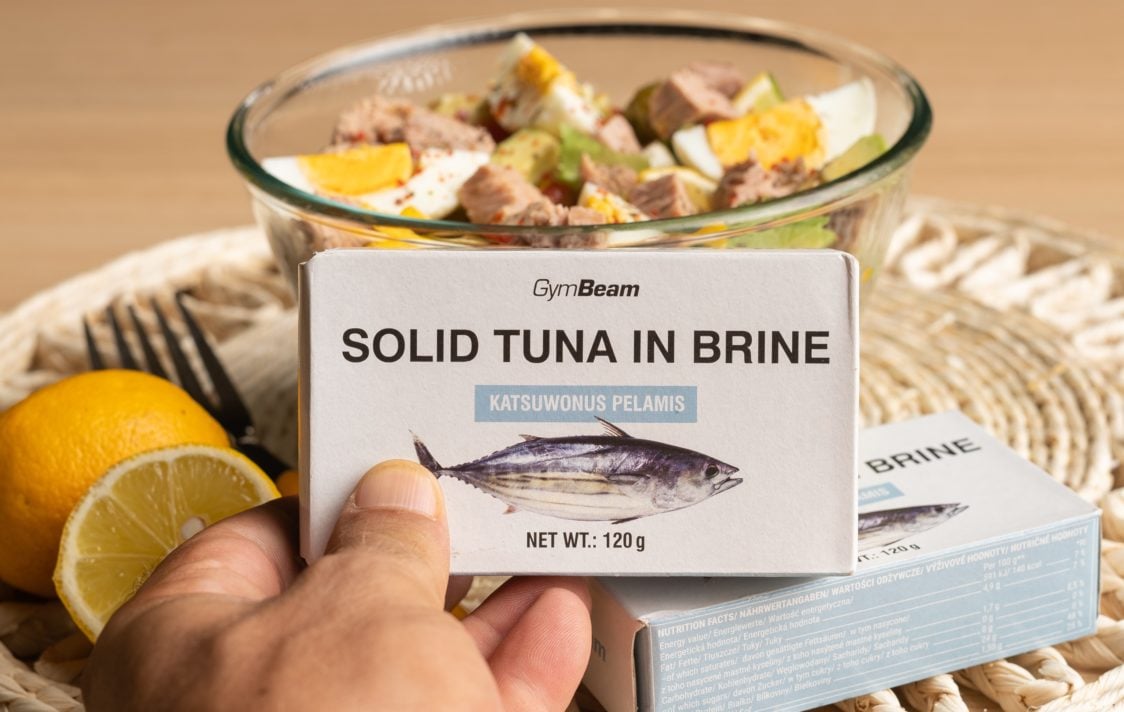Table of Contents
We all know the uneasy feeling of hunger in the stomach, loud rumbling within the belly, reduced concentration and mood, and all thoughts turning to food. Being hungry sometimes is perfectly natural, and we certainly shouldn’t be afraid of that feeling. It’s a useful body signal about the need to replenish our energy reserves. It’s just as well to have the occasional craving for your favourite chocolate. However, you should wise up if hunger or cravings appear too often and make it difficult for you to function normally.
In today’s article, we will introduce you to their possible causes and advise how you can fight disproportionate hunger or cravings.
15 reasons why you’re always hungry
1. You drink very little water
Have you ever heard the saying that hunger is just disguised as thirst? Maybe there really is something to it. If you feel hungry, try drinking some water. You might find that the craving for chocolate or another helping of lunch was really just thirst. Water will help partially fill the stomach and thus reduce hunger. Of course, we don’t want to tell you to have 2 litres of water instead of lunch. A glass of water before a meal can be a great help, in particular when dieting. You may also be convinced by the results of research carried out on slim men who drank 568 ml of water before eating. The final findings show that these men ate fewer calories and felt more satiated. [1]
A study of fifty overweight women who drank 500ml of water before breakfast, lunch and dinner showed similar results. It is important to mention that these fluid amounts were beyond their normal drinking regimen. The results at eight weeks showed that the women had a lower appetite and also decreased their body weight without being on any diet. [2]
How much water should you drink?
There’s no point in needlessly pouring excess fluid into yourself. However, if you feel that a large enough portion of food will not fill you up, try drinking a glass of water before eating. You can also drink during meals. The ideal fluid intake should be between 30 – 45ml per kg body weight. If it’s hot outside or you’re exercising, the need may be even higher. You can tell for yourself if your body has enough fluids by the colour of your urine. It should be slightly yellow. The darker it is, the more dehydrated you are. If you want to learn more about the importance of a drinking regimen, you should not miss our article Hydration Before, During, After Training and How To Avoid Dehydration. [3]
Do you ever forget a water bottle on a hectic day, and then in the evening you’re horrified to discover that you’ve hardly had anything except coffee during the day? You don’t have to catch up on your drinking regimen in the evening and then get up all night to use the bathroom. Just try to help yourself with a simple catch-up tactic. Set alarm clocks on your phone to tell you to drink at specified intervals, or designated apps such as Water Drink Reminder or Hydro Coach can also help. While reminding you may be a nuisance at first, you’ll see that it helps you develop correct habits, and in time you might be able to manage without it. Plus, if you keep your eye on a water bottle or a designer bottle at all times, it will go much better.
If you drink little because you don’t like the water itself, try improving it with low-calorie flavourings, herbs, fruit, BCAA or try tea, but beware of liquid calories.

2. You drink alcohol
Alcohol can rightly be considered one of the greatest enemies of weight loss. Why? After drinking it, your appetite increases and you are also less likely to choose more suitable foods. For example, if you’re coming home from a party at 4 a.m., will you stop by the kebab station, or will you make a vegetable salad with turkey at home? I assume you’ll decide upon the first option. Likewise, you’d probably rather have fried chips with beer than fruit with Greek yogurt. [4-6]
The hunger and cravings for high calorie meals, however, continue the next day after the party. You’re more likely to crave salty treats like hamburgers or pizza with a hangover. After satisfying these cravings, the need for sweets will start to come to the surface, urging you to have a few spoonfuls of that delicious ice cream in the freezer. Well, there will probably be doughnuts, chocolate, and your favourite cookies you’ve been resisting for a few weeks. What’s going on with you? [7]
How to fight alcohol cravings?
Don’t worry, you’re not under the control of another worldly being from another galaxy, or reincarnated as Obelix. Look elsewhere for the culprit. There are actually two. They are called leptin and ghrelin and affect our satiety, hunger and overall satisfaction from food. If you spend all night indulging in alcohol and not getting enough sleep, there will be more disruption of these hormones. This then manifests itself in the familiar hungry like a wolf scenario and cravings for everything you have and don’t have at home. You may also be struck by an extreme craving for salty food that you can’t even remember having outside of a hangover. This can be caused by the diuretic effects of alcohol, which lead to the body getting rid of more water. The sodium in the salt then helps to retain water in the body to help reduce dehydration. [5]
If you want to avoid excessive hunger and cravings associated with drinking alcohol, it is best to avoid it. If you’re going to party, don’t forget to eat first. The ideal choice is a dish rich in protein. With alcohol, you can also prepare healthy foods, which will not be too calorific, but will reduce the risk of overeating of fast food at 4 a.m. Do not forget to replenish liquids with non-alcoholic drinks during the evening. Try drinking an extra half litre of water before bed. It can help if you add a little salt and replenish electrolytes, for example in capsule form. In the morning, do not be tempted by the cravings and replenish yourself with liquids. Then have a healthy breakfast made of quality ingredients that will contain plenty of protein, but also carbohydrates and fats. If you manage even a short walk after eating, you’ve almost won against the hangover cravings and hunger.

3. You are not eating enough protein
Protein is the macronutrient that has the highest satiating effect. For example, if you add an extra helping of chicken or tofu to your favourite vegetable salad, you won’t be hungry immediately after eating it. This macronutrient is not only important to the body just because of the greater feeling of satiety. It is a building block of the cells of the immune system, our muscles and other tissues. This is also why athletes in particular focus on the intake of protein. [8-11]
But you wonder why you should be the one to tackle this when you’re trying to lose weight rather than gain muscle? In this case, protein is beneficial for you. Proteins protect muscle mass from burning for energy, which occurs especially during strict dietary measures. You will also appreciate the fact that muscles burn more energy than fat at rest. In addition, proteins have the highest thermal effect of all the macronutrients (the energy that the body uses to process a given nutrient). Sufficient consumption thus yields only positives. [8-11]
How to replenish proteins and increase their intake?
The amount of protein needed in the diet varies from person to person. However, it is generally between 0.8 – 2 grams per kilogram of body weight. If you are not very active, your intake should be at the lower limit. Athletes should hit the upper limit. In terms of protein sources, try to eat a variety, and not only choose one food type to get the full spectrum of amino acids. Regularly include different types of meat, fish, seafood, dairy, legumes, plant-based meat alternatives (tofu, tempeh, seitan), pseudo grains, nuts and seeds. Whey protein, vegetable protein or protein bars can be a great way to supplement your protein intake.
If you’re interested in other protein-filled food tips, you shouldn’t miss our article 20 Foods That Add Protein To Your Diet.

4. You do not have sufficient fats in your diet
The times when fat was demonized and people were afraid of it is perhaps long gone. It is a macronutrient that is necessary for the proper functioning of hormones in the body or the absorption of certain vitamins. Moreover, it is a taste carrier. I’m sure all peanut butter lovers can vouch for that, right?
The advantage of fat is also the fact that out of all the macronutrients it takes the longest to digest, and it also slows down the absorption of other nutrients that you eat with it. This partly explains why you feel so heavy when you eat fried cheese with fries and tartare sauce. Try to use the abilities of fat to your advantage and add adequate amounts to each meal.
How to add fat to your diet?
There are countless ways to sneak vegetable or animal fat into a meal. Drizzle your salad with olive oil, add a spoonful of cashew butter to mash and pour your favourite seeds into your yogurt. You will see that in addition to more satiety and satisfaction, your dish will also take on a whole new taste dimension.
However, keep in mind that it is not always desirable for food to be digested for a long time. For example, if you drink protein after a workout, your goal is to quickly replenish the body with proteins needed for regeneration and growth of muscle mass. It is best mixed together with water to allow it to be absorbed into the body as quickly as possible.

5. You prefer refined carbohydrates to complex
You are rushing to work in the morning, and devour a doughnut at speed along the way, and then wonder why you’re hungry again in an hour? Of course, you will, it contains high amounts of simple sugars, which has a high glycaemic index. This will increase the level of sugar that our bodies try to regulate by producing more insulin quite quickly. What happens then? Glycaemic levels may plummet even lower than before you ate the doughnut, and you’re hungry and craving something again. In extreme cases, these fluctuations can resemble a long roller coaster ride with recurring cravings, hunger, and the satisfaction of eating some goodies to satisfy these cravings. [12-14]
How to steer clear of simple sugars?
If you love the sweet taste and sugar is your best friend, you will also love various sweeteners. These are characterized by a low or even zero glycaemic index and so do not affect glycaemic levels as much. For example, you can try chicory syrup, which is typically lower in sugar but also high in soluble fibre. This can also be found in the popular psyllium, which is also known to have a beneficial effect on glycaemic levels. [15]
However, other sweeteners such as erythritol, stevia or xylitol will also do you a great service. You don’t have to worry about consuming them. They are commonly found in nature as part of fruit. If you are trying to lose weight, you will appreciate that erythritol and stevia do not contain any calories.
You might be interested in these products:
6. You don’t sleep enough
Have you ever haven’t had enough quality sleep due to study or work? If so, remember what your diet looked like during those days. Perhaps your food portions were larger than usual, your sweet cravings were more frequent, and somehow you couldn’t satisfy them. It’s not a coincidence. Again, the hormones of satiety and hunger – leptin and ghrelin – are responsible. When you sleep very little, levels of leptin, which promotes satiety, may decrease. Conversely, the level of ghrelin, which induces feelings of hunger, increases. [16]
It may surprise you to know that just one night of little or no sleep can affect your calorie intake. This is also confirmed by research carried out on young men who slept only from 2 to 6 a.m. They felt hungrier when they woke up and ate more than 550kcal on average over and above their normal intake for the whole day. If you want to lose weight, don’t count calories, and try to listen to your body, you can easily fall into sleep deprivation and make reaching your goal difficult.
How much sleep do we need?
Sleep is one of the essential functions that are absolutely necessary for the body. You should get 7 – 9 hours of quality sleep each day if you do not want to risk increased cravings, hunger, attention deficits, mood changes or delayed reactions. And if you’re one of those people who have difficulties with sleep, don’t miss the advice from our article How To Fall Asleep Quickly? Try These Simple Tips For A Better Sleep.

7. You eat very little fibre
As has already been said in connection with sugar, fibre also affects the feeling of satiety after a meal. I’m sure you’ll agree that a person feels more satiated after a whole-grain roll, topped with a handful of vegetables, than after a pastry made of classic white wheat flour. Every adult should eat at least 30g of fibre per day. In addition to its positive effect on satiety, it is also important for the proper functioning of the digestive system.
How to increase your fibre intake?
If you don’t want to be hungry right away after food, choose foods that are high in fibre. This prolongs the digestion time and thus has a positive effect on glycaemic levels. It makes the blood sugar rise and fall more gradually, its level will be more balanced, and you won’t be constantly hungry and craving something. Choose whole grain side dishes such as rice, pasta, baked goods, couscous and the like. At the same time, you should eat 400g of vegetables and 200g of fruit each day, which will also make sufficient intake of fibre much easier. Instead of a doughnut, try an apple pie for breakfast, which has 7g of fibre in one portion.
8. You are bored
You’ve found yourself visiting the fridge several times during a boring afternoon, wondering what goodies you can consume? Like stress, eating when bored can bring momentary satisfaction thanks to dopamine. But I suppose eating when bored isn’t a habit you want to develop. [17]
The constant monitoring of YouTube and Instagram accounts that show the preparation of your favourite treats can give you cravings. Who doesn’t want to watch tempting cakes, macaroni and cheese, waffles doused in chocolate or huge scoops of ice cream? And when let yourself go into their preparation, you’re just annoyed that the result doesn’t look like the video. Well, what do you do? You’re going to satisfy your cravings with some snack that won’t disappoint you with its appearance.
How do you beat eating out of boredom?
These social media profiles can act as a great inspiration when you don’t know what to cook. However, if you have a problem with constant cravings and hunger, viewing them in this case will be more of a hindrance. How about you stop following them, write down the names of your favourite accounts for inspiration, and really only visit them when you know you’ll want to cook by them? Instead, try tracking accounts that give you interesting information or otherwise broaden your horizons.
And if you eat out of boredom without constantly watching the food you eat, we have the simplest advice for you. Entertain yourself. Go play sports, draw, learn a language, listen to music, read or do any other activity that will occupy your mind away from food. You’ll see that if you get active and get into the right flow, you’ll forget all about the cake in the fridge. Another option is not to buy these goodies at all. What you don’t have at home, you just don’t eat.

9. You’re under stress
When you’re stressed, it’s easy to have a tight stomach and not even think about food. By contrast, there is also a group of people who struggle with food when stressed. Thanks to the released dopamine, at least for a while that piece of chocolate, will give them a sense of satisfaction. But then what? They reach for more chocolate, candy bars, cake, chips, and continue to encourage this habit themselves. However, it will not reduce overall stress and you will not solve the problem. You’re more likely to make a new one. [18]
How to fight eating under stress?
With this overeating, you could develop an unhealthy relationship with food, or eventually become overweight, or obese, and the health risks that come with a higher weight. Plus, you’d be unhappy about getting fatter, which could cause additional stress. If you know that emotional eating is your problem, try to avoid foods you crave in a crisis.
Don’t keep secret supplies in your work desk, and don’t buy ridiculous amounts of goodies. During stressful periods, boxes of food that you prepare in advance can be a great help. You’ll have a clearly defined portion and you don’t have to think about what you might eat during the day. This will also save you time, which you can spend working on an important project or preparing for an exam.
If you’re looking for advice on how to deal with stress, don’t miss the article Why Is Stress Dangerous and How To Reduce It?
10. You are dieting or eat small portions
Do you feel like you’re eating almost all the time and yet you’re still hungry? Try to take a closer look at the size of your portions. For breakfast have yogurt, for snacks a handful of nuts, then a small apple, for lunch some soup, for snacks a bar, after training half a banana and for dinner a salad with some tuna. Even if it’s seven portions, acknowledge that it’s probably not the optimal diet for an active adult. If for some reason you have a low energy intake, it makes sense to be hungry. The body needs energy to function, which it is simply asking for. Too restrictive calorie intake is often associated with extreme dieting, which unfortunately ends in an unwanted yo-yo effect.
How to determine the correct portion size?
There is no point in reducing your energy intake to the extreme and gambling with your health. Such an approach is unsustainable in the long term. In addition to hunger and uncontrollable cravings, you would probably experience bad moods, a drop in energy, reduced focus and many other negative signs of reduced calorie intake. You’d better use our calculator to calculate your recommended intake based on your input and bounce back from these values. You’ll see that hunger after every meal will be a thing of the past. With an adequate intake, you will eat well, and the results will come soon. Plus, you’ll be much more likely to maintain them, too.

11. You exercise more than usual
You used to go swimming with a friend twice a week, and now you’ve added three strength trainings and two hours of running? An average 80 kg man would also burn approximately 3500 extra kcal in a week through these activities. So it’s perfectly natural for the body to start asking to replenish lost energy. This can manifest itself, for example, in an irresistible craving to eat all you see in the fridge, freezer and ice cream stand as well. So what can you do about it?
How to adjust intake to a higher training load?
If losing weight is not your goal, it is worth replenishing the energy you burn from these added activities. This is the only way to maintain a balance between caloric intake and output, and you are likely to avoid uncontrollable hunger or cravings too. Well, in case you want to gain weight, you need to eat a little extra. The simplest way will again be to determine your optimal caloric intake according to the advice in our article How To Calculate Energy and Macronutrient Intake For Weight Loss, Or Muscle Gain.
12. You don’t pay enough attention to your food intake
You put on a movie, open a bag of chips, and after a while you find it’s empty. Sure, you could blame it on your roommate, but they’re not home and you don’t even have a dog to blame it on. You’re sitting alone on the couch, and you feel like having some more treats. What can you do to prevent this scenario from happening again?
How to eat properly?
Learn to eat consciously. When you’re hungry, turn off your work computer, set your phone aside, sit at the table in the kitchen and pay full attention to your food. Enjoy its taste, feel the texture and enjoy every bite slowly. Research shows that people who eat consciously can deal much better with their emotions and also recognize feelings of both hunger and satiety. If you would like to learn to eat consciously and perhaps work towards a slimmer figure as a result, you should not miss our article the 30-day Challenge To Help You Lose Weight Permanently and Eat Healthily.

13. You work at night and have an irregular routine
You can also see increased hunger and cravings if you work shifts and have an irregular schedule. You don’t eat at night because at this time you’re used to sleeping, you fall into bed in the morning with exhaustion and you don’t even eat breakfast. If you starve for this long, the body will start seeking the necessary energy to function properly. This can manifest itself in uncontrollable hunger or brutal starvation. In this case, the disrupted biorhythm and the mentioned hormones leptin and ghrelin may also be to blame. [22]
How to eat when working night shift?
If you start your shift at 6 p.m. and finish at 6 a.m., it’s not appropriate to starve yourself the whole time. When you’re not sleeping, you need to energize your body so that it can function properly at night. You don’t want to deal with excessive fatigue and poor concentration at work, right? This could have fatal consequences, for example, in a healthcare setting or when working with machinery.
Eat a bigger meal (dinner) before you go to work, it can be around 17:00. Between 21:00 and 22:00, have one more larger snack. A tuna sandwich or a bagel you make at home can work well. That shouldn’t be your last meal, though. Even during the night, replenish your energy regularly with small snacks. Try protein bars, protein milkshakes, fruit, yoghurt, vegetables or a piece of quality dark chocolate. An adequate water intake is also very important. After arriving home from work, have a light breakfast and go to bed. After waking, continue with a later lunch. It’s best if you prep lunch boxes in advance to just heat up. Nobody wants to stand by the stove for hours after night shift waiting for a dish to be cooked, right?
During night shifts, observe what foods will give your body energy, and which in turn will cause heaviness and weigh down your stomach. I think we can all agree that it’s not the best idea to order a cheese pizza with your colleagues at three in the morning, is it? So try to follow the rules of healthy eating during this more demanding period and don’t be tempted by calorie-rich goodies.
14. You are pregnant or breastfeeding
If you are in the advanced stages of pregnancy or breast-feeding, it is natural for you to be more hungry. Your body needs more energy to be able to support a child. It doesn’t mean you should eat for two during pregnancy. A child does not need as much energy for development as an adult does to maintain all bodily functions. Pregnancy is therefore no reason to eat doughnuts for breakfast, snack on chocolate and have burgers for dinner.
How to eat during pregnancy and whilst breast-feeding?
In both cases, it is certainly appropriate to increase intake. When breast -feeding, it is recommended to increase your normal intake by 450 – 500 kcal, which your body will use to produce milk. At the same time, it is important to drink plenty of fluids.
It is also essential to increase calorie intake at some stage of pregnancy. In the first trimester, the child’s energy requirements are minimal. There is therefore no need to increase intake. In the second and third trimesters, it is then optimal to increase the energy received by about 200 – 300 kcal. To give you a better idea, this is energy that can be achieved by combining 150g of 0% Greek yoghurt, an apple and 20g of cashew nuts. [19-21]

15. Health problems
Hunger and cravings sometimes have causes elsewhere, and can also indicate serious illness. In some cases, it is linked to diabetes or thyroid disease, for example. Certain medicines, such as psychopharmaceuticals, may also increase appetite.
How to address hunger and cravings caused by disease or medication?
If you feel that you are struggling with hunger and cravings for these reasons, you should address your problem directly with your doctor. They will examine you thoroughly and determine the best way forward.
What is the lesson?
Having hunger or cravings is common, and sometimes everyone experiences it. But if those needs are beyond a certain level that doesn’t seem normal to you, it’s time to get your lifestyle in order. Start by focusing on your drinking regimen, diet composition, sleep and your activity during the day. However, you should also pay attention to alcohol, boredom and stress, which can lead to overeating. And if you have all these aspects under control, you can also try to consult a specialist to rule out possible illness.
Do you have someone amongst your friends who constantly complains of being hungry or has cravings? Share this article with them and maybe you can help them finally solve the problem.
[1] Robert A Corney et al. – Immediate pre-meal water ingestion decreases voluntary food intake in lean young males – https://pubmed.ncbi.nlm.nih.gov/25893719/
[2] Vinu Ashok Kumar Vij, Anjali S. Joshi – Effect of excessive water intake on body weight, body mass index, body fat, and appetite of overweight female participants – https://www.ncbi.nlm.nih.gov/pmc/articles/PMC4121911/
[3] Barry M. Popkin et al. – Water, Hydration and Health – – https://www.ncbi.nlm.nih.gov/pmc/articles/PMC2908954/#R1
[4] Samantha J. Caton et al. – Alcohol, Appetite and Loss of Restraint – https://sci-hub.se/https://pubmed.ncbi.nlm.nih.gov/26627094/
[5] Martin R Yeomans et al. – Alcohol and food intake – https://pubmed.ncbi.nlm.nih.gov/14557794/
[6] Martin R Yeomans – Alcohol, appetite and energy balance: is alcohol intake a risk factor for obesity? – https://pubmed.ncbi.nlm.nih.gov/20096714/
[7] Samantha J Caton et al. – Alcohol, Appetite and Loss of Restraint – https://pubmed.ncbi.nlm.nih.gov/26627094/
[8] Jäger, R. et al. – International Society of Sports Nutrition Position Stand: Protein and exercise. – https://doi.org/10.1186/s12970-017-0177-8
[9] Gosby, A. K. et al.– Protein leverage and energy intake – https://doi.org/10.1111/obr.12131
[10] Westerterp-Plantenga, M. S., Lemmens, S. G., & Westerterp, K. R. – Dietary protein – its role in satiety, energetics, weight loss and health – https://doi.org/10.1017/S0007114512002589
[11] Kamal Patel – Thermic Effect of Food – https://examine.com/topics/thermic-effect-of-food/
[12] James M. Lattimer, Mark D. Haub – Effects of Dietary Fiber and Its Components on Metabolic Health – https://www.ncbi.nlm.nih.gov/pmc/articles/PMC3257631/
[13] The lowdown on glycemic index and glycemic load – https://www.health.harvard.edu/diseases-and-conditions/the-lowdown-on-glycemic-index-and-glycemic-load
[14] Erik E. J. G. Aller et al. – Starches, Sugars and Obesity – https://www.ncbi.nlm.nih.gov/pmc/articles/PMC3257742/
[15] Zacharová a kol. – Chicory syrup as a substitution of sugar in fine pastry – – https://doi.org/10.5219/890
[16] Shahrad Taheri et al. – Short sleep duration is associated with reduced leptin, elevated ghrelin, and increased body mass index – https://pubmed.ncbi.nlm.nih.gov/15602591/
[17] Remco C.Havermans et al. – Eating and inflicting pain out of boredom – https://www.sciencedirect.com/science/article/abs/pii/S0195666314005200
[18] Edward Leigh Gibson – Emotional influences on food choice: sensory, physiological and psychological pathways – https://pubmed.ncbi.nlm.nih.gov/16545403/
[19] Breastfeeding Your Baby – https://www.acog.org/womens-health/faqs/breastfeeding-your-baby?utm_source=redirect&utm_medium=web&utm_campaign=otn#foods
[20] Eating Right Before and During Pregnancy – https://www.ucsfhealth.org/education/eating-right-before-and-during-pregnancy
[21] Energy Requirements, Energy Intake, and Associated Weight Gain during Pregnancy – https://www.ncbi.nlm.nih.gov/books/NBK235247/
[22] Connection Between Circadian Rhythm and Hunger Discovered – https://news.feinberg.northwestern.edu/2019/03/connection-between-circadian-rhythm-and-hunger-discovered/


Add a comment